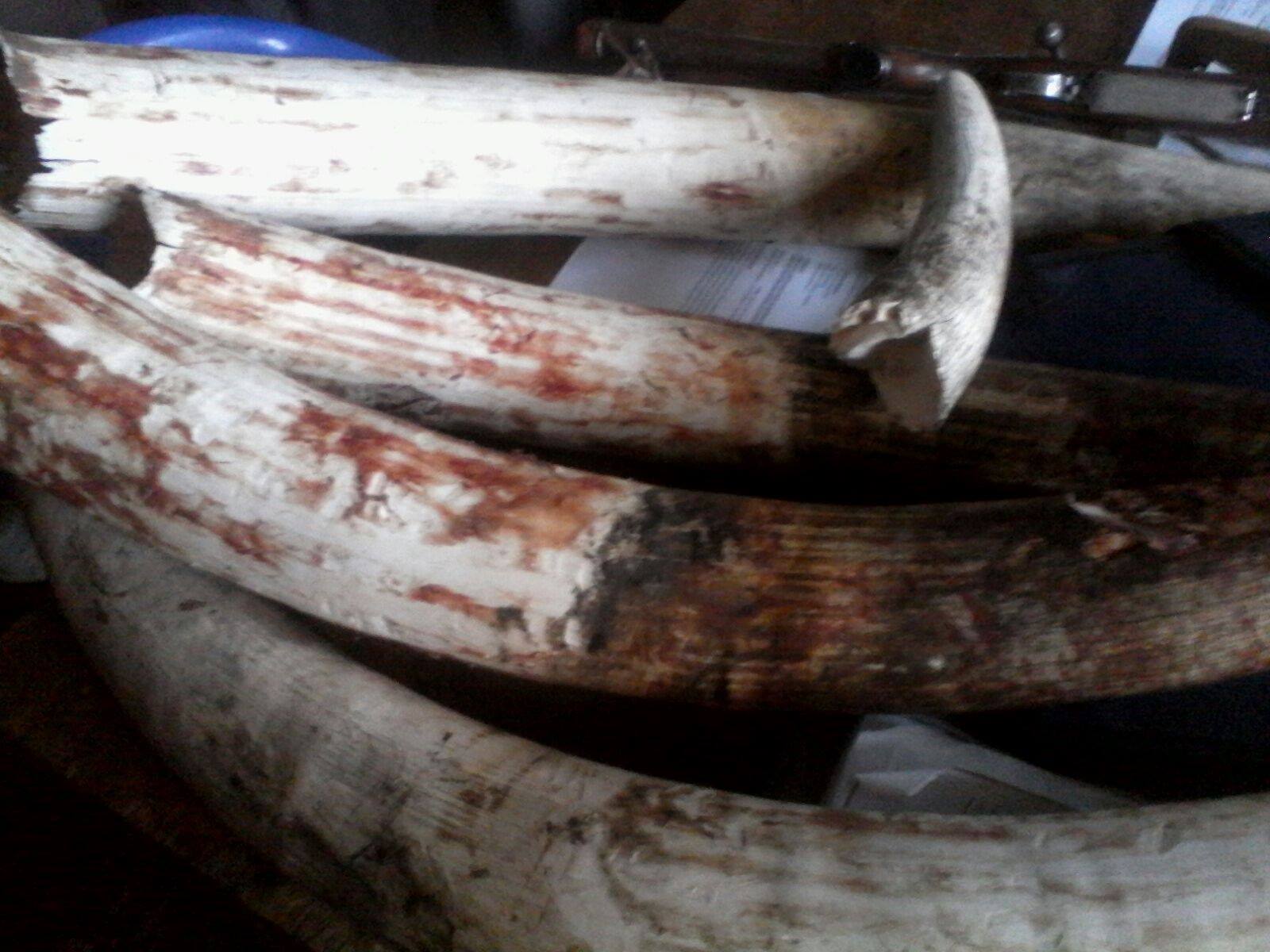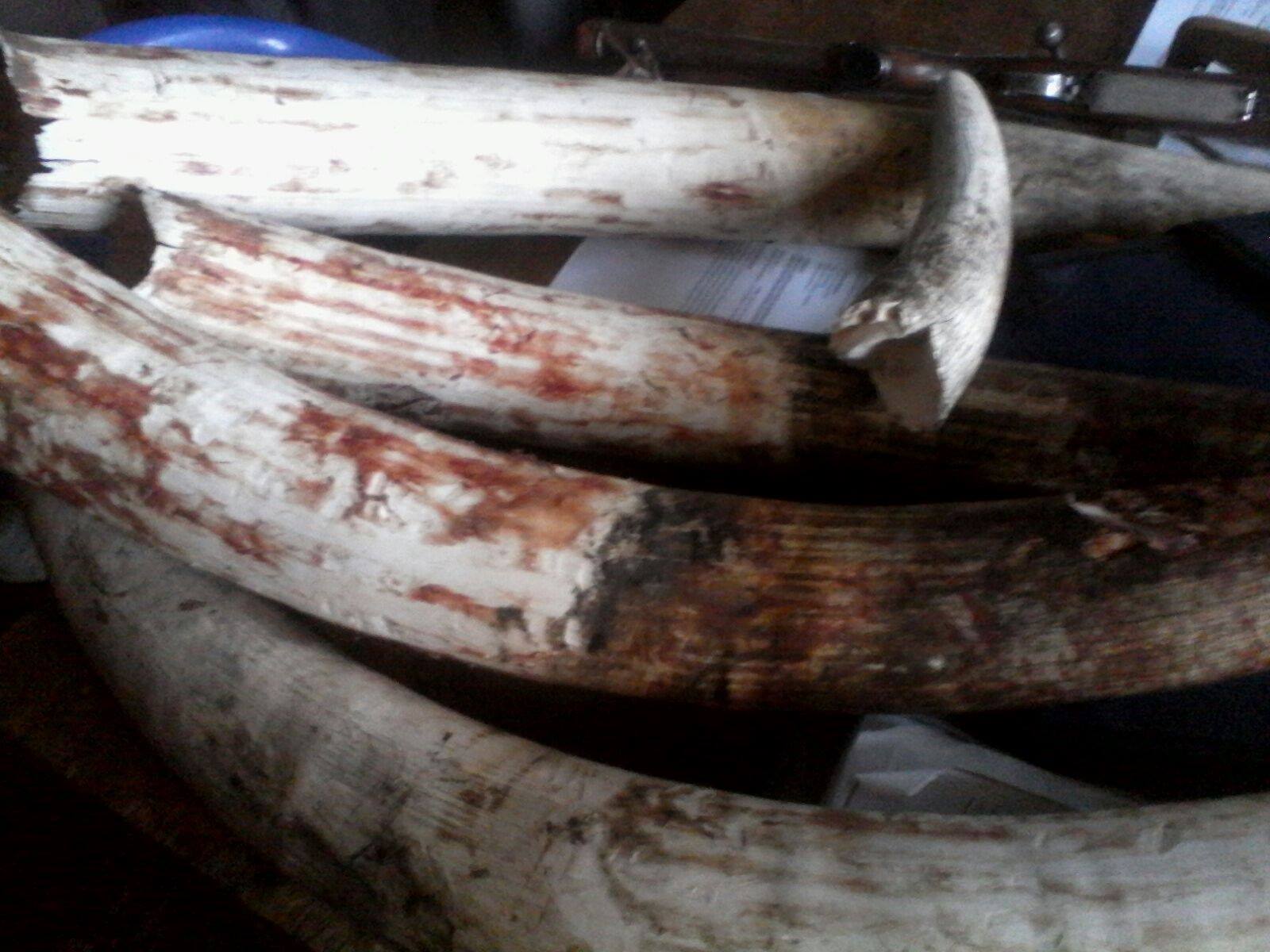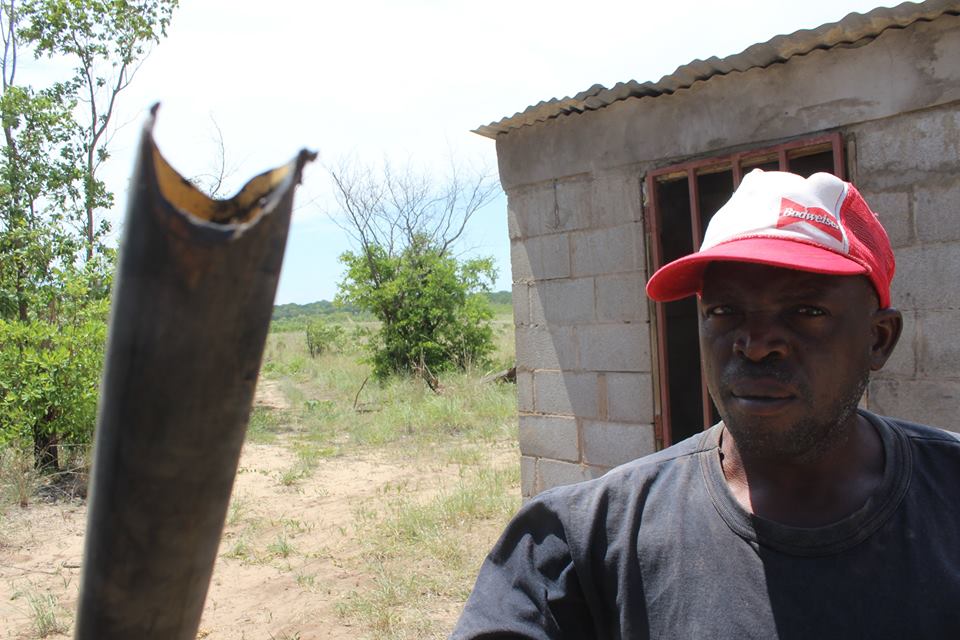
12 Apr Chinese demand drives Zambia’s ‘amateur’ ivory gangs
Dwindling elephant numbers and heightened demand for ivory from Chinese trafficking syndicates are fuelling a cross-border poaching war in the Zambezi region. Oscar Nkala investigates

In early 2016 at least 66 elephant tusks were recovered from Zambian poaching gangs operating in Zimbabwean national parks
The Zambian government says Chinese ivory trafficking syndicates based in the Southern African country are sponsoring the influx of Zambian poachers blamed for the recent spike in elephant deaths in the region.
According to wildlife groups, organised Zambian poaching syndicates have since 2012 mounted numerous cross-border poaching expeditions into neighbouring countries – with increasingly fatal results.
In the first months of 2016, at least 66 elephant tusks were recovered from Zambian poachers during 14 separate anti-poaching operations in Zimbabwe’s national parks in the Zambezi Valley. By the end of February, six suspected Zambian poachers had been killed in gun battles with Zimbabwean rangers in the area.
Data collected by Oxpeckers shows that at least 10 AK47s, .303 and .375 hunting rifles and nearly 200 rounds of ammunition have been recovered from Zambian poachers this year, mainly in Zimbabwe.
In Botswana, six elephants have been killed in recent incidents linked to Zambian poachers. Two Zambian nationals in a group of at least 30 suspected elephant poachers were shot and killed by the Botswana Defence Force during a gun battle at the Chobe National Park on January 4.
At least four Zambian nationals are on trial in Botswana after being arrested in connection with illegal possession of ivory since February.
Source of humiliation
Although it was not on the agenda, the role of Zambian nationals in regional ivory poaching took centre stage in February when wildlife and security ministers from Botswana, Zimbabwe and Zambia met in Victoria Falls to find ways to combat cross-border crimes.
Zambia’s Deputy Tourism Minister, Patrick Ngoma, apologised to his counterparts about the continued involvement of Zambians in cross-border elephant poaching, saying it had become a source of humiliation for the entire country.
He said the poaching gangs that cross the Zambezi River in canoes to conduct raids in the three southern neighbouring countries are directly sponsored by Chinese ivory trafficking syndicates, which are embedded in the business community in the capital Lusaka and other small towns in the Southern Province.
“Through investigations, we have found that most of the Zambian poachers work for and in collaboration with Chinese traffickers who pay them to embark on poaching expeditions in neighbouring countries. Once across the Zambezi [River], they sacrifice their lives and often get killed when the law enforcement agencies catch up with them,” Ngoma said.
“This is very humiliating for us because, as Zambians, we are now known for poaching throughout the region. We are also known for shooting back at game rangers and the security forces of neighbouring countries whenever confronted.”
Ngoma said newly enforced, stringent laws and counter-poaching strategies have made it difficult for poachers to operate in Zambia. The government has adopted paramilitary policing operations, which are being jointly implemented with aerial surveillance via unmanned aerial vehicles to protect its elephant populations in the Luangwa North and Luangwa South game reserves.
“In Zambia we have introduced drones to conduct extensive, round-the-clock surveillance over poaching-prone areas in major national parks,” he said. “The poachers are now incapable of entering our parks, so they cross into Zimbabwe, Angola, Botswana and Namibia to kill elephants for ivory to feed the Chinese market in Zambia.
“Our plan is to have drone patrols operating across all national parks to prevent that as soon as possible,” Ngoma said.

The KAZA conservation area has been identified as a point through which Zambian poachers enter and exit the three countries south of the Zambezi
Regional security
Zambia has proposed the formation of a cross-border regional security force to crack down on the illicit ivory trade that runs through the Kavango Zambezi Transfrontier Conservation Area (KAZA).
The conservation area straddles the boundaries of Zambia, Zimbabwe, Botswana and Namibia, and has been identified as a point through which Zambian poachers enter and exit the three countries south of the Zambezi.
A Zambian wildlife crimes tracker told Oxpeckers that poachers who have flooded the region over the past three years are responding directly to heightened demand for ivory from locally based Chinese ivory trafficking syndicates. A member of the Zambian Friends of Wildlife/Lusenga Trust, the source requested anonymity for fear of victimisation by the Zambian government and reprisals from Chinese ivory trafficking syndicates based in Lusaka.
“I beg to differ with the minister’s assertion that locals are crossing into neighbouring countries to poach elephants because Zambia has improved its wildlife conservation systems,” the source said.
“It is because the poachers have finished the free-roaming elephants in our country, so they now poach in neighbouring countries to meet the endless demand for ivory from Chinese syndicates which are known to operate freely in Lusaka, Livingstone and Choma in the Southern Province.”
Zimbabwean conservationist and co-chair of the Bhejane Trust, Trevor Lane, said the emergence of “amateur” Zambian poachers in neighbouring countries could be proof that elephants have been wiped out in the traditional poaching grounds of the Luangwa (Zambia) and Sebungwe (Zimbabwe) valleys.
“The old Zambian poachers used heavy weapons and would kill with just one shot. The behaviour and competence of the new poachers indicates that the old Zambian poachers have been thinned out and inexperienced recruits are now being sent in.
“The fact that the Zambians are now trekking as far south as Hwange National Park to poach indicates that the Sebungwe elephant populations have been all but wiped out by now,” Lane said.
He said the problem has been worsened by the apparent unwillingness of both the Zambian government and police authorities to cooperate in cross-border poaching crimes.
“The Zambian poachers will not stop coming across the Zambezi to poach because they know they will be safe as long as they cross back into their country. Since the beginning of the year, I can’t remember a time when Zambian police have co-operated in cross-border investigations, even after receiving confirmed reports on the movement of armed poachers,” he said.

One of two hungry, dehydrated Zambian poachers who handed themselves in at a lodge near Victoria Falls in Zimbabwe after wandering lost through the Zambezi National Park. The two confessed to being part of a group of up to 20 Zambian poachers who killed elephants in Botswana’s Chobe National Park early in January and then managed to escape into Zimbabwe after the Botswana Defence Force killed one member of the group and injured several others in a counter-attack. Photo: Bhejane Trust
Zero tolerance
Data published by Zimbabwean conservation group Zambezi Society in 2015 showed that the population of elephants in the Sebungwe Valley had dropped by 75% percent, from 14,000 in 2001 to 3,500 by the end of 2014.
The group estimated the elephant population in middle Zambezi Valley complex to have dropped by 40%, from 18,000 in 2001 to 11,500 by the end of 2014.
Botswana is the only country in the region which enforces a publicly declared shoot-to-kill policy that has been praised for reducing poaching crimes but criticised by neighbours Zambia and Namibia as too harsh.
Both countries have lost several citizens in shoot-outs with the Botswana Defence Force anti-poaching units. Environment, Wildlife and Tourism Minister Tshekedi Khama says despite protests from its neighbours, Botswana will not outlaw the shoot-to-kill policy.
“Our position is that we defend ourselves when we find poachers with weapons because our security forces will be under threat. My contention is that there are many countries that prefer to sit on stadiums and shout at the game instead of playing it.
“There is a lot of lip-service whereby people criticise the way Botswana is dealing with the poaching crisis, yet they are never there to assist us with alternative anti-poaching initiatives,” Khama said.
Botswana’s zero tolerance policy in cracking down against wildlife crimes earned the country accolades from a United States Congressional delegation which toured the region to assess wildlife conservation efforts recently.
The delegation, which visited Mozambique, Zimbabwe, Botswana and Namibia, described widespread cross-border ivory trafficking as a threat to the survival of elephant populations.
“Of the countries that we have visited in the region, Botswana is doing a great job. We found that poachers in the other three countries are heavily armed and dangerous. It is therefore important that strong, credible means to deal with them are put in place to deal with ivory trafficking crimes. In Mozambique, there are areas where some animal species are literally extinct,” said delegation leader Senator John Flake.
See related investigations:
• Spotlight on Zambezi’s poaching problem
• Namibia’s secret ivory business
